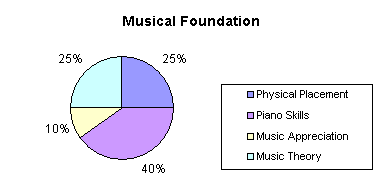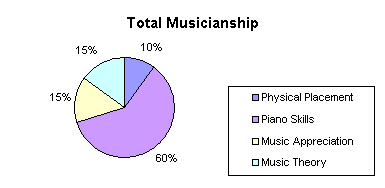premier source in classical music and more

learning forum: setting your goal It is so important to establish a solid foundation in any kind of musical study your child pursues. This requires a teacher who knows the importance of acquiring good habits from day one. Once this foundation is set, your child will not only perform beautifully, but will also be able to start a different instrument with ease. This process may seem frustrating and time consuming at first, but you should never rush your child through this critical phase. It will take more time to correct bad habits later than to get it right from the start. The initial stage called Musical Foundation has two phases- Musical Foundation I (MFI) and Musical Foundation II (MFII). MFI is for children who are first time learners and plan to reach phase II or even Total Musicianship. MFII is for students who already have several years of private lessons and intend to continue further studies, perhaps reaching Total Musicianship. Musical Foundation is also ideal for students who may wish to switch to another instrument in the future or for those who thrive under minimum pressure and enjoy playing the instrument 'just for fun'. Whatever your final goal may be, I believe the following areas of learning are the minimum requirements you need to obtain a quality piano education. This chart illustrates the importance of each area of learning for a piano student:
Students should be actively involved in programs outside regular lessons (i.e. auditions). I also highly recommend supplementing your regular repertoire with the The Associated Board of Royal Schools of Music (ABRSM) for its rigorous program in Music Theory and Practical Examinations. These examinations can be used as a tool to track progress.
This stage is for students who have already established a solid foundation and are ready for a more intense level of training with a serious commitment to daily practice. There are two phases in Total Musicianship - Total Musicianship I (TMI) and Total Musicianship II (TMII). Both phases are considered great achievements and children who reach this far will always enjoy music the rest of their life. Total Musicianship II is for the exceptional few who love the competitive edge and extra challenge, or perhaps for those who consider a college degree in Music. This chart illustrates the importance of each area of learning for a piano student:
Students should be actively involved in programs that offer auditions and competitions. I also highly recommend supplementing your regular repertoire with the ABRSM for its rigorous program in Music Theory and Piano Examinations.
|
||||||||||||||||||||||||||||||||||||||||||||||||||||||||||||

